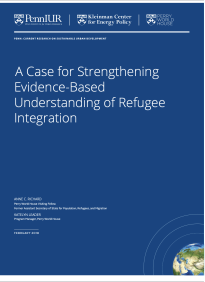Key Message
To significantly enhance refugee integration in the United States, it is imperative to develop comprehensive cross-agency initiatives that set clear goals and measurable indicators of success. These initiatives should involve collaboration between federal, state, and local governments, as well as non-governmental organizations, community groups, and other stakeholders. Prioritizing detailed studies of refugee integration, particularly in urban areas where the majority of refugees settle, will provide valuable insights into the specific needs and challenges faced by refugees in different contexts. Additionally, incentivizing evidence-based learning and the replication of successful programs will ensure that effective integration strategies can be scaled and adapted to various settings. By addressing the current deficiencies in data collection and program evaluation, policymakers and practitioners can create more responsive, efficient, and sustainable integration policies that not only improve the lives of refugees but also strengthen the social and economic fabric of host communities.


